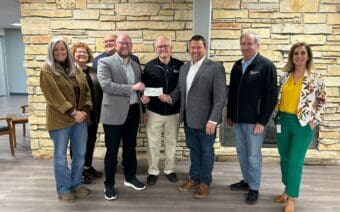
December 5, 2022
CLEVELAND – One thing Lakeshore Technical College student Emily Stevens said she has always known is her future would somehow involve cows.
Traveling six hours and 400 miles from her hometown in Indiana to attend the same college her father attended in rural Wisconsin nearly 40 years ago, however, wasn’t necessarily on her radar.
Emily’s dad, John, is a 1984 graduate of Lakeshore Technical College’s (1290 North Ave., Cleveland) dairy herd management program – the very same one Emily is now enrolled in.
“When I was trying to look for places to go after high school for just cattle, my dad said, ‘What about where I went?’” she said.
And as it’s often said, the rest was history.
Emily said her love for nature’s milk producers and her curiosity for what farming was like in Wisconsin sent her down a similar path her father took a handful of decades earlier.
“I didn’t just look into it,” she said. “I applied and got accepted, and I was like, ‘alright, that’s where I’m going to go.’”
Lifelong passion
Emily, who grew up on her father’s dairy farm in East Central Indiana, said she has always loved cows.
“To be honest, cows have always been one thing I’ve gravitated toward,” she said. “I understand cows more than I do people sometimes.”
One of the things Emily said she likes most about Wisconsin’s dairy industry is its prevalence throughout the state.
“I was the only kid that lived on a dairy farm in my high school,” she said. “We were the only dairy, commercial dairy in the county. So, it was hard for me to fit in.”
Things, Emily said, are definitely different in the Dairy State.
“Up here, everybody knows somebody that has a farm or works on a farm – it’s everywhere,” she said. “So, for me, it feels a lot more natural.”
Lakeshore’s dairy offerings
James Lemerond, vice president of Instruction at Lakeshore Technical College, said the school currently offers two programs geared toward farming, with plans of adding a third.
“We currently have a two-year agribusiness science and technology associate’s degree program,” he said. “We also have a dairy herd management technical diploma, which students can get through in nine months and focuses specifically on dairy.”
Lemerond said the college is looking to add a dairy business management associate’s degree.
“So it would take that basis of the dairy herd management, one-year program and combine it with business courses that are in the agribusiness program for the second year,” he said.
Lemerond said both programs have had solid, steady participation.
“Our agribusiness has seen steady growth over the last five years, and many of those students use that associate degree to transfer to a four-year university, typically UW schools with agricultural programs,” he said.
Lemerond said he isn’t surprised Emily came from out of state to enroll in the dairy herd management program.
“We have a lot of opportunities within the Lakeshore Technical College region for employment, so we do see local students,” he said. “But, we also see students come from out of state and sometimes from Canada. Another interesting aspect, especially in our dairy herd program, we see a lot of non-traditional occupation – meaning female students. Two of the last three years, the entire class – 100% of the class – was made up of females, which is very unique.”

Emily Stevens said she enjoys the hands-on learning opportunities her internship at a local farm offers her. Submitted Photo
Emily said one of the things she likes best about Lakeshore’s dairy herd program is its hands-on work.
“I learn more, and I’ve noticed this a lot in agriculture – I learn more hands-on than sitting in the classroom,” she said.
Lemerond said Lakeshore organizes its curriculum in a sequence where students are in a position to use their education.
“It does start with that theory or that in-class learning,” he said. “Then it does move into lab activities, and then internships where the students do go to site farms.”
Lemerond said students are engaged in labs or on-site internships early “so they can use that knowledge and skill immediately.”
“We also have a good partnership with the Ag Education Center of Wisconsin,” he said. “Some of our classes and labs are located on that same campus location, so we can get those students into the opportunities Ag Education Center also offers.”
For Emily, that hands-on experience is taking place on the same farm her dad interned at in the ’80s.
She said she works 25-30 hours a week at Saxon Homestead Farm in Cleveland – doing pretty much anything they need her to do, which is mostly milking and scraping.
Emily said she has also helped with a few calves and treated sick cows.
“My boss, Karl, he’ll be there to help walk me through things, but for the most part, he is just like, ‘here, do it,’” she said. “And that helps a lot. I’ve learned a lot better that way because I know that it has a practical use.”
Knowing what she’s learning in the classroom has a practical use outside of the classroom, Emily said she finds herself paying attention more.
She said the interaction she has with other students is also beneficial because not everyone has the same experiences.
“You get a taste of everything for the most part,” she said. “They all have different setups, different parlor types. We’ll talk about what we’ve done and how it differs from everything else that other kids are doing and we’ll be able to discuss the differences.”
Differs from Indiana
Though Emily said she has appreciated growing up on a dairy farm, it is far from the advantages she has witnessed in Wisconsin.
“We didn’t have computerized records or any monitoring system, head locks or a free-stall barn,” she said. “Dairy farming in Indiana, at least where I’m from, there’s not a lot of them – so it’s a lot harder to get the latest technology and what is readily available up here.”
Emily said that carries over into maintenance and repairs as well.
“If you call a repairman for something going down here in Wisconsin, they’ll probably be there in, depending on where you are, a half hour, 45 minutes, at most an hour,” she said. “I remember, we had something in our milking facility break down and it was two hours before anyone got there. And we didn’t get done milking until 1 a.m., because it took that long for them to get there because there’s not very many. So it’s a lot harder to get parts and people to do the jobs that need to be done. Many of the farms are a lot smaller.”
Emily said she’s enjoying learning the many things the dairy herd management class has to offer, some she – even as someone who grew up on a dairy farm – wasn’t even aware of herself.
“All the different software for recording things is fascinating because we had notebooks and a big wheel at my farm in Indiana,” she said. “At the farm I work at now, they have a computer and everything is on that computer. So, if you have a cow that is on her sixth lactation, you can go back to her second lactation and see if she had mastitis. You can find that out in about five minutes, and at home, it would have taken us probably two hours to do that.”
Emily said she’s been able to blend what she describes as her “cow-sense” with what she’s learning in class and at her internship.
“I’ve always kind of had a natural, what I like to call ‘cow-sense,’ of being able to notice when a cow isn’t feeling good,” she said. “But in school, we’re learning a lot more about why she may not be feeling well.”
A likely move
Emily said she’s on track to graduate in the spring and would eventually like to return and stay in Wisconsin “because there are a lot more and better employment opportunities.”
“I’d like to one day manage or own my own dairy,” she said. “My ideal setup would be about 400 jerseys in probably a robot facility because I liked how that works and the freedom that it provides.”
Lemerond said Emily’s prospects are good – as Lakeshore’s most recent graduate survey shows 100% of graduates from its dairy herd management program and agribusiness science and technology program were employed within six months of graduating.
“It goes back to our local area – there’s a lot of jobs in agriculture around here,” he said. “And then folks who do come in from out of state or even out of the country, they probably are going to go back and take those skills into an environment where they have something already waiting for them.”
More information about Lakeshore Technical College’s agriculture programs can be found at, gotoltc.edu/programs-and-courses/degree-programs.
 Empower innovation and advance industry leadership
Empower innovation and advance industry leadership Hsu’s Ginseng deeply rooted in Marathon County
Hsu’s Ginseng deeply rooted in Marathon County






